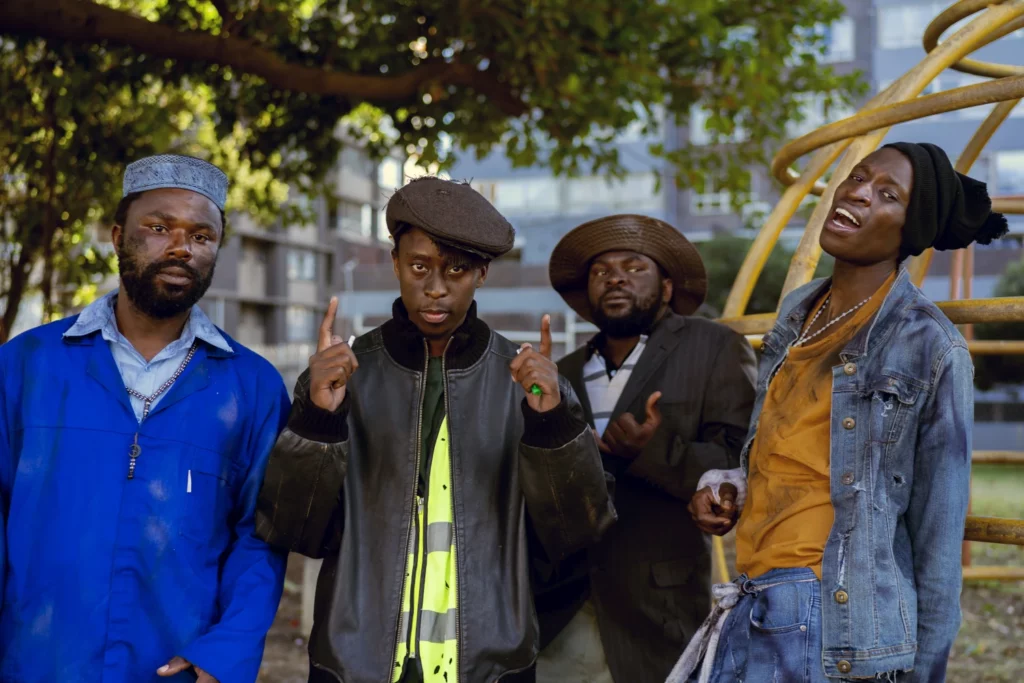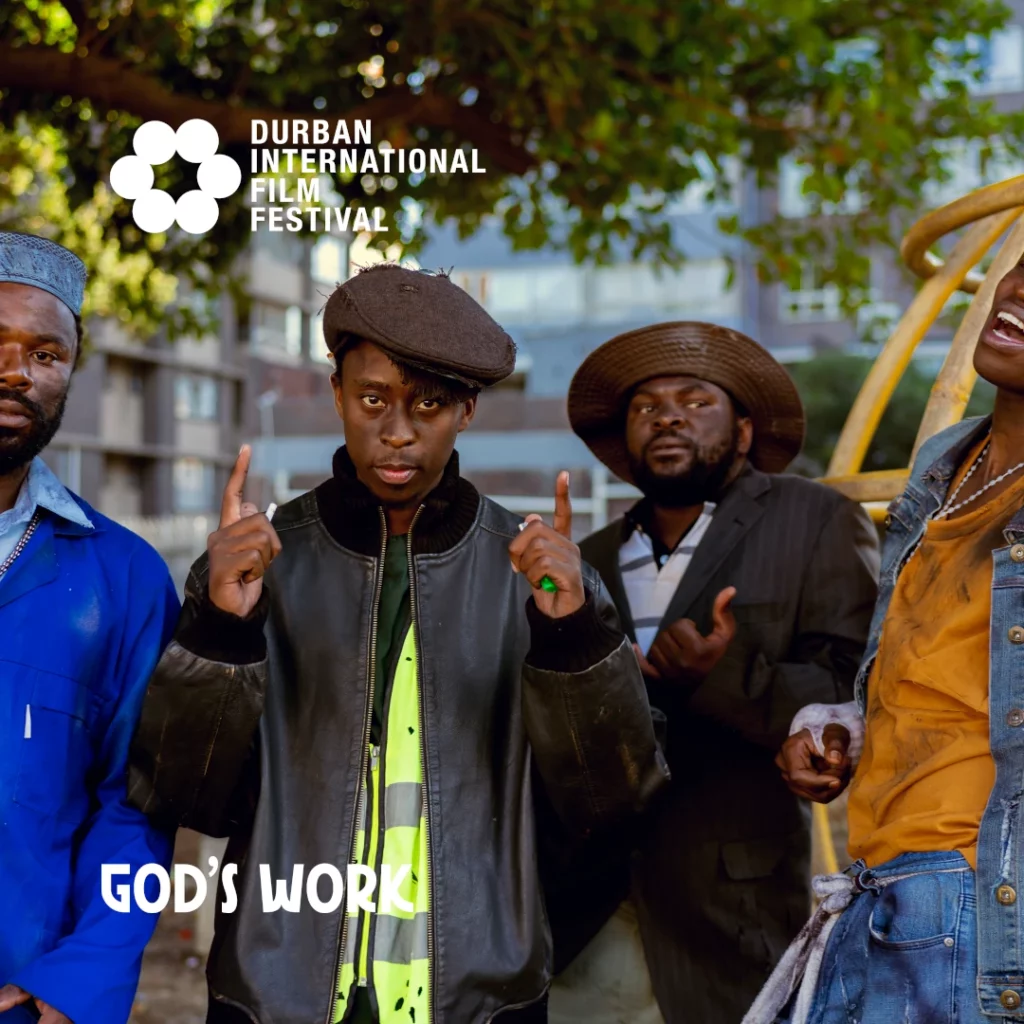By Tshi Malatji

God’s Work merges fiction and reality through surreal dream sequences and satirical commentary, overshadowed by the dramatic portrayal of a group of homeless men who survive day-by-day in a hostile South African city. The film has multiple points of focus, enforcing a chaotic message about the mess created by poverty and survival. It is centered, however, around a loose brotherhood of homeless men who are committed to each other and to their day-by-day survival.
There is also the film-within-the-film of a documentary filmmaker, who attempts to capture the lives of these men. In this way, the film can critique and analyse the role of filmmaking itself. For instance, in one scene, the men all proclaim, while shooting the documentary, that they do not do drugs. This happens humorously between scenes of them taking in copious amounts of various substances. The filmmaker also imposes too much of their will on the men, telling them where to sit, bringing politicians to their housing occupation and pressuring them to participate in the documentary.
The film is mainly told through the perspective of Simphiwe, a manic hot-head, who experiences dreams about their family. They are the roughest in the group and the most unforgiving. Yet, they are also the most troubled by metaphysical visions. A dance in the frame of the passage. Their brother was covered in traditional face paint. Their ex-girlfriend in a coffin.
At no point are women significantly featured in the film. Then men discuss women at some point, in a particularly painful patriarchal tone. The political activist is a 15-year-old girl, but she is portrayed as delirious and unable to speak comprehensively. Only Simphiwe’s dead ex-girlfriend is important to the film, but only as a trauma. The homeless men do not have strong relationships with women.
Resignation and survival
On the surface, the film covers a sleeping sickness called “resignation syndrome” which may just be death. The cause is not explained, but it is hinted to just be an exhaustion from living. This is shown through characters who refuse to wake up. Those who do sleep are haunted by surreal dream sequences. But this illness mainly affects the homeless so people do not care. The film also spends little time exploring this.
“Are you afraid of sleeping?” one character asks the other. “The only time I feel alive is when I’m dreaming” Simphiwe answers.
Political parties play a big role in the film, as they do in South African life. “You can’t wake up if you don’t fall asleep” is a repeating slogan by a political activist who tries to recruit the homeless men into an unnamed and convoluted political struggle for an organisation called the Ubuntu Freedom Fighters, a satire of the Economic Freedom Fighters political party. The Democratic Alliance are mocked through a People’s Alliance Movement councillor who gives the homeless salt & vinegar chips on Mandela Day as a public relations exercise.
God’s Work is a dark satire in form, but unfortunately not in taste. A character called Brother Biko kisses a machete and snorts cocaine from a store savings card. But, the flow of events are not satirical. They are serious and violent. The police hound, beat up and threaten to kill the homeless men. There is nothing funny about the overarching narrative. It is a commentary on the sustaining poverty and inequality of post-apartheid interlaced with some comedic scenes.
Yet, there are also scenes where the characters pick up dead bodies from the ground. Simphiwe is both wild and manic, navigating between resignation and excess. They kill their brother in one of their dreams. They mourn their wife in another. They laugh in the mirror. They are insane. In Simphiwe’s confession scene, they finally explain their trauma. They grew up in a “house of hunger” where his mother had “emptiness in her eyes” which took over everything until it began to grow in his eyes.
At some point, there is a breakdown between Thobani (the supporting actor) and the person making the documentary. “Let me be the one to ask you a question,” Thobani retorts. It is at this point in the film that the film decides its identity as a drama. It crushes the film-within-the-film from that point. It erases its comedy as well for the rest of the runtime.
Ultimately, God’s Work is unconventional, but effective. People are always sleeping in the film. Sleeping in passages. Sleeping in halls. Sleeping in rooms. When awake, they occupy surrealist visions through drug-induced trips.
A significant visual moment is when a spotlight guides Simphiwe quite literally through his memories. With such clarity, Simphiwe rests better at night. But it’s not clear if they will wake up again.
Catch the film at DIFF: https://ccadiff.ukzn.ac.za/diff46/gods-work/
Screening Schedule:
20 Jul 19:00 Suncoast 6
26 July 13:00 Denis Hurley
27 Jul 17:00 Watercrest 1
3 Aug 12:00 The Labia,
2 Aug 12:00 The Bioscope
This review emanates from the Talent Press programme, an initiative of Talents Durban in collaboration with the Durban FilmMart Institute and FIPRESCI. The opinions expressed in this article are those of the author (Tshi Malatji) and cannot be considered as constituting an official position of the organisers.

